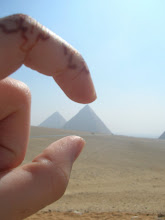Saturday, May 24, 2008
Getting out or Getting Through?
This struggle occurs on a daily basis for millions of Egyptians. Difficult to watch, I find myself merely a passerby, honing in briefly then cruising out, back to the hotel and eventually, back to the US. Frustration builds inside me, as I wonder how I can possibly help to get these people out of this desolate situation. Merely driving through you are neglected the opportunity to fully observe. You are given a glimpse, a preview, upon which you make your judgments or assumptions about how life must be. Upon actually visiting places like Establ Antar, however, I have learned that the people in these communities manage to make it through each day. As much as they might want to escape this lifestyle, they manage to evade these dreams of an easier life and instead focus their efforts on getting through each day.
As a student studying abroad, I can't help but think of the things I will do once I am out of Egypt. When times are trying or people difficult, I remind myself that there is an end to my stay here, and regardless of the physical ailments or cultural misunderstandings that plague me, in a few weeks time I will be out. My time here has led me to realize that my absence does not cancel out what I have observed; the phrase "out of sight, out of mind" seems faulty. How can I erase the images of women sitting in the streets with their children, begging for money or young children wandering the streets alone, dirty and dressed raggedly. I have only been here two weeks and I find myself now wondering less about quick fixes, instant solutions and more about fully understanding the problem. It takes more than just a preview to understand a whole movie. More often than not, the previews are the most dramatic scenes loosely strung together so you get a gist of the type of movie. But previews are often misleading. I find myself thinking less of ways to remove these people from their situation and more about ways to trudge through, to change the system in a way that will benefit these people. The easy way is out, but most don't have that option.
Monday, May 5, 2008
Upper Egypt
The sweltering heat is made bearable only due to the arid desert air. Upon arriving in Luxor we were given a few hours to explore our surrounding, so a few friends and I took a stroll down the
Saturday, May 3, 2008
First Impressions
Since arriving two (three?) days ago, I have already begun to feel immersed in the culture. Perhaps I anticipated the differences in culture so much or maybe it will hit me harder sometime in the near future, but I do feel surprisingly at ease...in some sense. You only get one chance at a first impression, so here it is:
A permanent haze encompasses the city. Guards dressed in white uniforms patrol nearly every block on the streets on the island of Zamalek. Tourist police, in order to ensure the safety of the tourists. Zamalek, considered a higher class neighborhood of Cairo, serves as a microcosm for the general structure, both physical and social, of the city as a whole. Though considered the "Manhattan" of Cairo, the sidewalks are littered with cigarette butts, animal droppings, cans and bottles, and a plethora of other objects. BMWs, vans, and many older vehicles cruise through the narrow streets, often barely stopping to allow pedestrians to cross. Though many streets are paved, the curbs are nearly a foot up off of ground level, and bricks and stones jut out unevenly. This apparent lack in sanitary standards, however, does not reflect the attitude of its peoples.
As I learned from my "crash-course Arabic" instructor, Syanora, there are really only two classes: the rich and the poor. The gap is ever growing, not just because of a faltering economy but because of cultural norms. Many of my everyday encounters on the island are with tourists or local shopkeepers, who persistently smile at you, waving "souvenirs" or other items in your face, yelling out prices talking about discounts. Initially, you might think they just want your money, which they do. For many, however, this is their only source of income, for themselves as well as their families. Many of these people have gone to college or university and graduated with a degree in fields ranging from business to tourism to engineering, yet because of their social status they have no work despite their higher level of education. My natural instinct is to give what I have to these individuals, however, we are CONSTANTLY being warned to refrain from giving "bak sheish" (tips or small change). Young children and shopkeepers thrust themselves and their services or products in your face. Their physical condition appears lousy, to say the least; ripped shirts, dirty faces, scratched hands, and yet we are told to hold onto our money, don't cave to the innocent and persistent looks of the locals. Further contemplation on this issue is to come. For now, off to a Falouka on the Nile!



























